AngularJS with Rails app guide - Part 02
Bài đăng này đã không được cập nhật trong 7 năm
Chào các bạn, hôm nay chúng ta cùng nhau tìm hiểu tiếp tục về AngularJS đã được giới thiệu ở bài viết tháng trước nhé. Hôm nay sẽ là phần 02 của AngularJS with Rails app Guide.
Tạo và sử dụng Controller behaviors
Controller định nghĩa các behavior trong scope. Behaviors là những function xử lý data theo logic và hiển thị lên màn hình. Behaviors sẽ được controller định nghĩa ra nó sử dụng để hỗ trợ hiển thị data cho User và update model dựa trên các tương tác của User.
Để hiểu rõ thêm về Behavior thì chúng ta cùng thêm đoạn code sau - Hình ảnh mô tả sẽ có ở phần dưới:
***
File app/views/static_page/show.html.erb
***
<div ng-controller="staticPageController as vm" class="container">
<div class="py-5 text-center">
<h1>Test app with user's name: "{{models.user}}"</h1>
<p class="lead">Items length is: {{models.items.length}}</p>
<p ng-hide="inCompleteCount() == 0">Incompleted count is: {{inCompleteCount()}}</p>
</div>
<div class="input-group mb-3">
<input type="text" class="form-control" placeholder="Add new item">
<div class="input-group-append">
<button class="btn btn-outline-secondary" type="button">Add</button>
</div>
</div>
<div class="row">
<div class="table-responsive">
<table class="table table-striped table-sm">
<thead>
<tr>
<td>Description</td>
<td>Done</td>
</tr>
</thead>
<tbody>
<tr ng-repeat="item in models.items">
<td>{{item.action}}</td>
<td><input type="checkbox" ng-model="item.done"></td>
</tr>
</tbody>
</table>
</div>
</div>
</div>
***
File app/assets/javascripts/angular/controllers/static_page_controller.js
***
"use strict";
angular.module("userApp")
.controller("staticPageController", staticPageController);
function staticPageController($scope) {
var vm = this;
var models = {
user: "Test user",
items: [
{action: "Test action 1", done: false},
{action: "Test action 1", done: false},
{action: "Test action 3", done: true}
]
};
$scope.models = models;
$scope.inCompleteCount = function() {
var count = 0;
angular.forEach($scope.models.items, function(item) {
if(!item.done) count ++;
});
return count;
}
}
Hình ảnh mô tả kết quả:
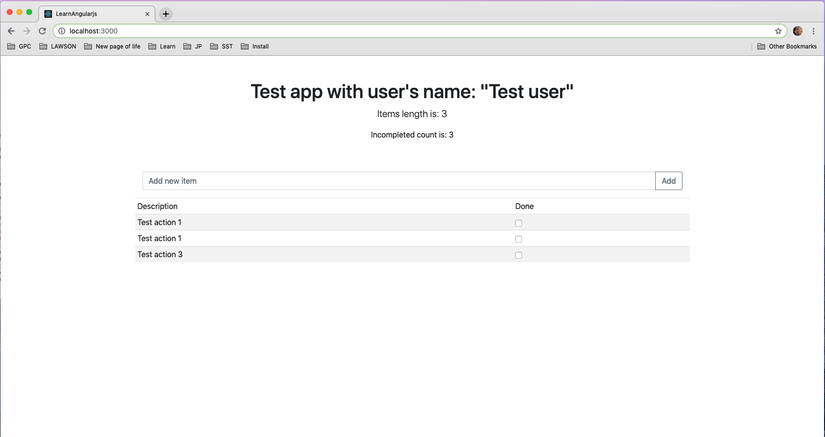
Giải thích:
$scope.inCompleteCount = function() {
var count = 0;
angular.forEach($scope.models.items, function(item) {
if(!item.done) count ++;
});
return count;
}
====> Behaviors đã được định nghĩa bởi việc thêm functions vào trong object $scope. Chúng ta đã thêm function trả về số lượng các item chưa completed (incompleted) bằng cách lặp qua $scope.models.items và tăng count mỗi khi item.done là false.
<p ng-hide="inCompleteCount() == 0">Incompleted count is: {{inCompleteCount()}}</p>
Để gọi behavior trên thì chúng ta sử dụng cặp ngoặc {{}}, ngoài ra còn sử dụng thêm directive ng-hide nữa. Directive ng-hide sẽ ẩn đối tượng nếu thoả mản điều kiện đứng sau ng-hide. Trong trường hợp trên thì sẽ ẩn thẻ
khi `không tất cả các item đã được done hết rồi.
Sử dụng behavior dựa trên behavior khác
***
File app/views/static_page/show.html.erb
***
<div ng-controller="staticPageController as vm" class="container">
<div class="py-5 text-center">
<h1>Test app with user's name: "{{models.user}}"</h1>
<p class="lead">Items length is: {{models.items.length}}</p>
<span ng-hide="inCompleteCount() == 0"
class="badge"
ng-class="warningLevel()">
Incompleted count is: {{inCompleteCount()}}
</span>
</div>
<div class="input-group mb-3">
<input type="text" class="form-control" placeholder="Add new item">
<div class="input-group-append">
<button class="btn btn-outline-secondary" type="button">Add</button>
</div>
</div>
<div class="row">
<div class="table-responsive">
<table class="table table-striped table-sm">
<thead>
<tr>
<td>Description</td>
<td>Done</td>
</tr>
</thead>
<tbody>
<tr ng-repeat="item in models.items">
<td>{{item.action}}</td>
<td><input type="checkbox" ng-model="item.done"></td>
</tr>
</tbody>
</table>
</div>
</div>
</div>
***
File app/assets/javascripts/angular/controllers/static_page_controller.js
***
"use strict";
angular.module("userApp")
.controller("staticPageController", staticPageController);
function staticPageController($scope) {
var vm = this;
var models = {
user: "Test user",
items: [
{action: "Test action 1", done: false},
{action: "Test action 1", done: false},
{action: "Test action 3", done: true}
]
};
$scope.models = models;
$scope.inCompleteCount = function() {
var count = 0;
angular.forEach($scope.models.items, function(item) {
if(!item.done) count ++;
});
return count;
}
$scope.warningLevel = function() {
return $scope.inCompleteCount() < 3 ? "badge-success" : "badge-warning";
}
}
Hình ảnh mô tả:
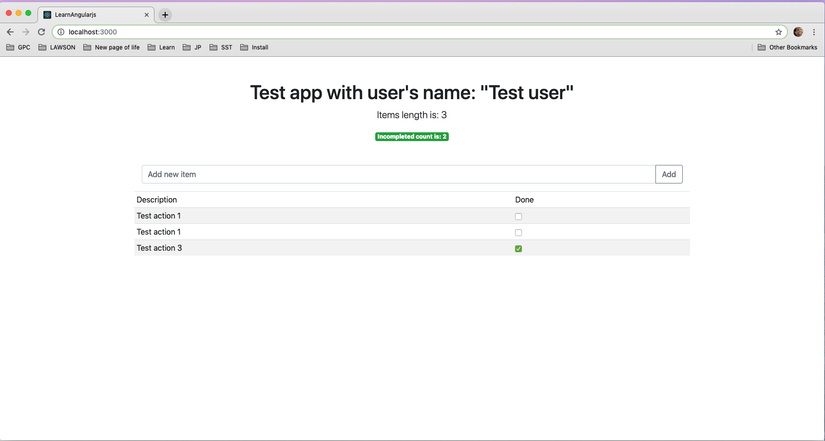
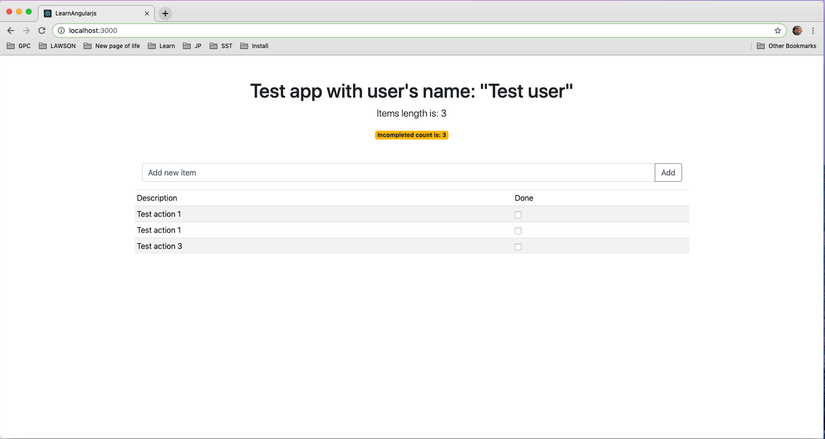
Giải thích:
$scope.warningLevel = function() {
return $scope.inCompleteCount() < 3 ? "badge-success" : "badge-warning";
}
Behavior warningLevel có nhiệm vụ trả về CSS class dựa trên điều kiện nếu số lượng incomplete item bé hơn 3 thì trả về "badge-success", ngược lại là "badge-warning".
<span ng-hide="inCompleteCount() == 0"
class="badge"
ng-class="warningLevel()">
Incompleted count is: {{inCompleteCount()}}
</span>
Sử dụng behavior trên bằng ng-class để thay đổi CSS tương ứng với từng điều kiện.
Tạo behavior tương tác với User
Chúng ta sẽ tiến hành thêm button Add một item mới với action dựa trên User nhập vào, như sau:
***
File app/views/static_page/show.html.erb
***
<div ng-controller="staticPageController as vm" class="container">
<div class="py-5 text-center">
<h1>Test app with user's name: "{{models.user}}"</h1>
<p class="lead">Items length is: {{models.items.length}}</p>
<span ng-hide="inCompleteCount() == 0"
class="badge"
ng-class="warningLevel()">
Incompleted count is: {{inCompleteCount()}}
</span>
</div>
<div class="input-group mb-3">
<input type="text" class="form-control"
placeholder="Add new item"
ng-model="actionText">
<div class="input-group-append">
<button class="btn btn-outline-secondary"
ng-click="addNewItem(actionText)"
type="button">Add</button>
</div>
</div>
<div class="row">
<div class="table-responsive">
<table class="table table-striped table-sm">
<thead>
<tr>
<td>Description</td>
<td>Done</td>
</tr>
</thead>
<tbody>
<tr ng-repeat="item in models.items">
<td>{{item.action}}</td>
<td><input type="checkbox" ng-model="item.done"></td>
</tr>
</tbody>
</table>
</div>
</div>
</div>
***
File app/assets/javascripts/angular/controllers/static_page_controller.js
***
"use strict";
angular.module("userApp")
.controller("staticPageController", staticPageController);
function staticPageController($scope) {
var vm = this;
var models = {
user: "Test user",
items: [
{action: "Test action 1", done: false},
{action: "Test action 1", done: false},
{action: "Test action 3", done: true}
]
};
$scope.models = models;
$scope.inCompleteCount = function() {
var count = 0;
angular.forEach($scope.models.items, function(item) {
if(!item.done) count ++;
});
return count;
}
$scope.warningLevel = function() {
return $scope.inCompleteCount() < 3 ? "badge-success" : "badge-warning";
}
$scope.addNewItem = function(actionText) {
$scope.models.items.push({action: actionText, done: false});
}
}
Hình ảnh mô tả:
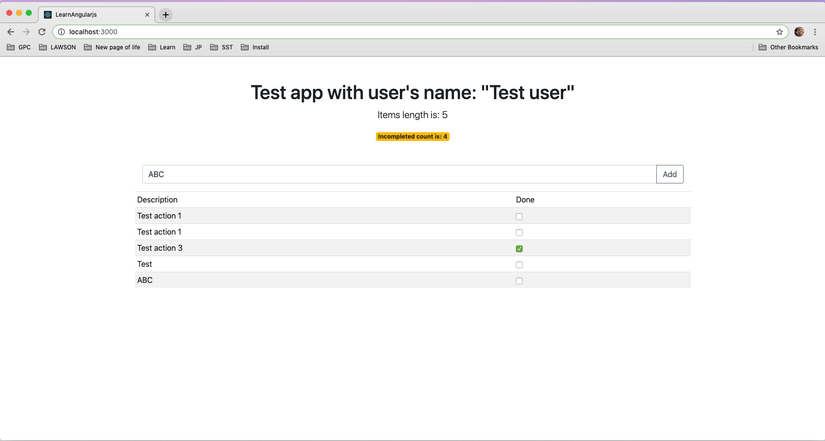
Hình trên cho thấy chúng ta đã thêm 2 item mới là Test và ABC thành công.
Giải thích:
$scope.addNewItem = function(actionText) {
$scope.models.items.push({action: actionText, done: false});
}
Định nghĩa behavior addNewItem để thêm vào cuối mảng $scope.models.items một Item nhất định với action là actionText được truyền vào từ tham số, done được thêm mặc định là false.
<input type="text" class="form-control"
placeholder="Add new item"
ng-model="actionText">
<div class="input-group-append">
<button class="btn btn-outline-secondary"
ng-click="addNewItem(actionText)"
type="button">
Add
</button>
</div>
Thêm ng-model là actionText như ở bài viết phần 01 đã trình bày, sau đó truyền nó vào ng-click để behavior addNewItem có được actionText.
Sắp xếp data model
Trong phần này, chúng ta sẽ thêm filter và orderBy cho dữ liệu $scope.models.items.
<tr ng-repeat="item in models.items | filter: {done: false} | orderBy: 'action'">
Thay đổi <tr> trong <table> như trên, ta được:
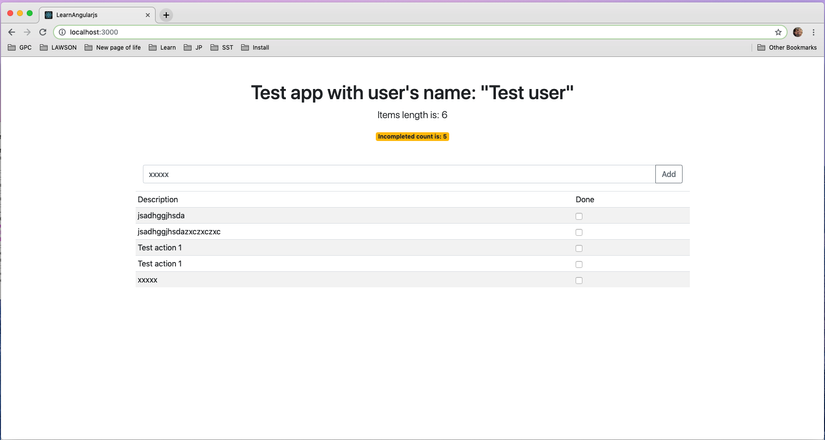
Giải thích:
Trong thẻ <tr> trên ta đã thêm phần filter riêng cho những item mà done là false và chỉ hiển thị những item thỏa mãn điều kiện này. Sau đó sẽ bắt đầu orderBy theo property action của object item.
Chú ý là phần thuộc tính được orderBy sẽ nằm trong cặp nháy đơn ' '.
Nâng cấp phần filter
Chúng ta cùng định nghĩa custom filter nào:
***
File app/views/static_page/show.html.erb
***
<div ng-controller="staticPageController as vm" class="container">
<div class="py-5 text-center">
<h1>Test app with user's name: "{{models.user}}"</h1>
<p class="lead">Items length is: {{models.items.length}}</p>
<span ng-hide="inCompleteCount() == 0"
class="badge"
ng-class="warningLevel()">
Incompleted count is: {{inCompleteCount()}}
</span>
</div>
<div class="input-group mb-3">
<input type="text" class="form-control"
placeholder="Add new item"
ng-model="actionText">
<div class="input-group-append">
<button class="btn btn-outline-secondary"
ng-click="addNewItem(actionText)"
type="button">Add</button>
</div>
</div>
<div class="row">
<div class="table-responsive">
<table class="table table-striped table-sm">
<thead>
<tr>
<td>Description</td>
<td>Done</td>
</tr>
</thead>
<tbody>
<tr ng-repeat="item in models.items | checkedItems: showComplete | orderBy: 'action'">
<td>{{item.action}}</td>
<td><input type="checkbox" ng-model="item.done"></td>
</tr>
</tbody>
</table>
<div class="form-check">
<input type="checkbox" class="form-check-input" ng-model="showComplete" id="showComplete">
<label class="form-check-label" for="showComplete">Show Complete</label>
</div>
</div>
</div>
</div>
***
File app/assets/javascripts/angular/controllers/static_page_controller.js
***
"use strict";
angular.module("userApp")
.controller("staticPageController", staticPageController);
function staticPageController($scope) {
var vm = this;
var models = {
user: "Test user",
items: [
{action: "Test action 1", done: false},
{action: "Test action 1", done: false},
{action: "Test action 3", done: true}
]
};
$scope.models = models;
$scope.inCompleteCount = function() {
var count = 0;
angular.forEach($scope.models.items, function(item) {
if(!item.done) count ++;
});
return count;
}
$scope.warningLevel = function() {
return $scope.inCompleteCount() < 3 ? "badge-success" : "badge-warning";
}
$scope.addNewItem = function(actionText) {
$scope.models.items.push({action: actionText, done: false});
}
}
***
FILE app/assets/javascripts/angular/filters/checked_items_filter.js
***
angular.module("userApp").filter("checkedItems", function() {
return function(items, showComplete) {
var resultArr = [];
angular.forEach(items, function(item) {
if(item.done == false || showComplete == true) resultArr.push(item);
});
return resultArr;
}
});
***
FILE app/assets/javascripts/application.js
***
//= require rails-ujs
//= require activestorage
//= require jquery3
//= require popper
//= require bootstrap-sprockets
//= require angular/lib/angular.min
//= require angular/app/user_app
//= require_tree ./angular/controllers/
//= require_tree ./angular/filters/
//= require_tree .
Hình ảnh mô tả:
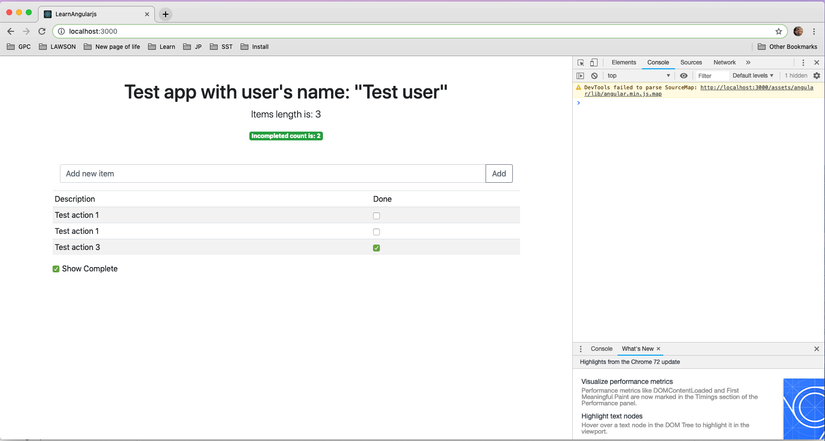
Giải thích:
Chúng ta tạo custom filter ở thư mục app/assets/javascripts/angular/filters/checked_items_filter.js
và sau đó thêm require cho nó vào application.js như trên.
angular.module("userApp").filter("checkedItems", function() {
return function(items, showComplete) {
var resultArr = [];
angular.forEach(items, function(item) {
if(item.done == false || showComplete == true) resultArr.push(item);
});
return resultArr;
}
});
Đoạn code trên sẽ nhận tham số showComplete và kiểm tra nếu nó là true thì sẽ hiển thị toàn bộ data, nếu là false thì sẽ check xem item đó có false hay không, nếu có mới thêm vào danh sách hiển thị.
Method filter định nghĩa bởi AngularJS chính là một module object được sử dụng để tạo ra factory filter, có nhiệm vụ trả về data sau khi được filter.
<tr ng-repeat="item in models.items | checkedItems: showComplete | orderBy: 'action'">
Ở phần view, chúng ta thay filter bằng tên của custom-filter (là checkedItems) và truyền tham số showComplete (là ng-model được định nghĩa ở checkbox bên trên).
Tổng kết
Ở phần 02 này chúng ta đã tìm hiểu được:
- Tạo và sử dụng behavior.
- Sử dụng behavior dựa trên các behavior khác.
- Sử dụng filter, orderBy.
- Tạo custom filter.
Đến đây đã thấy bài viết dài rồi, mình xin tạm dừng tại đây. Hẹn gặp các bạn ở phần 03.
All rights reserved